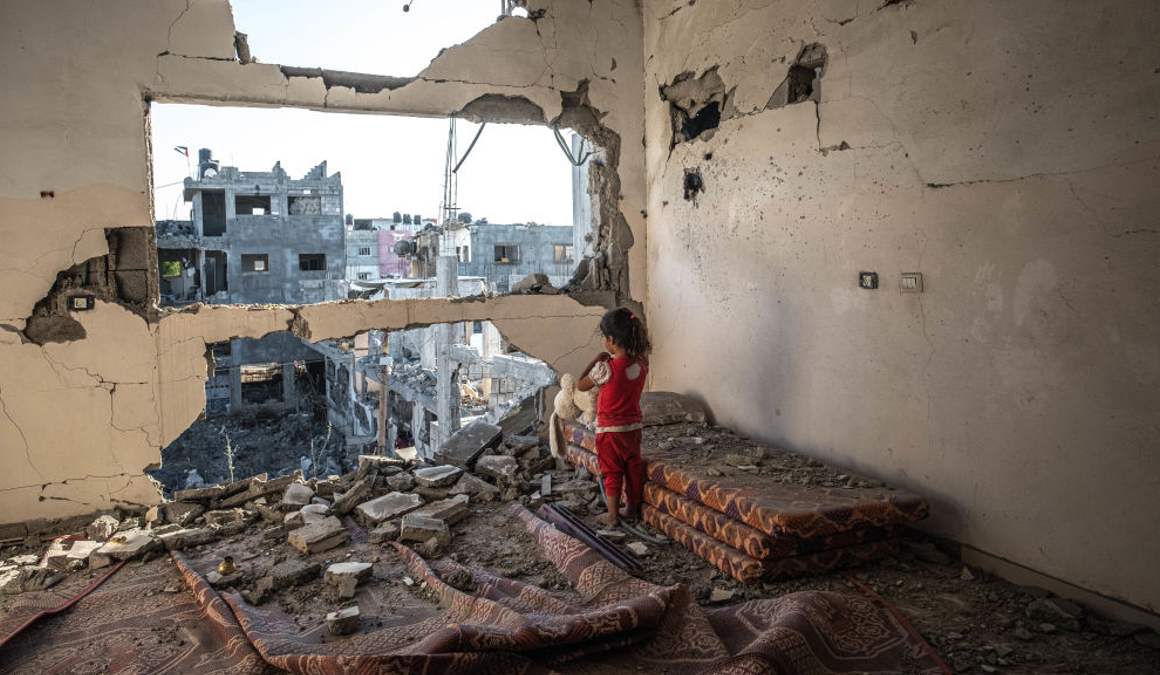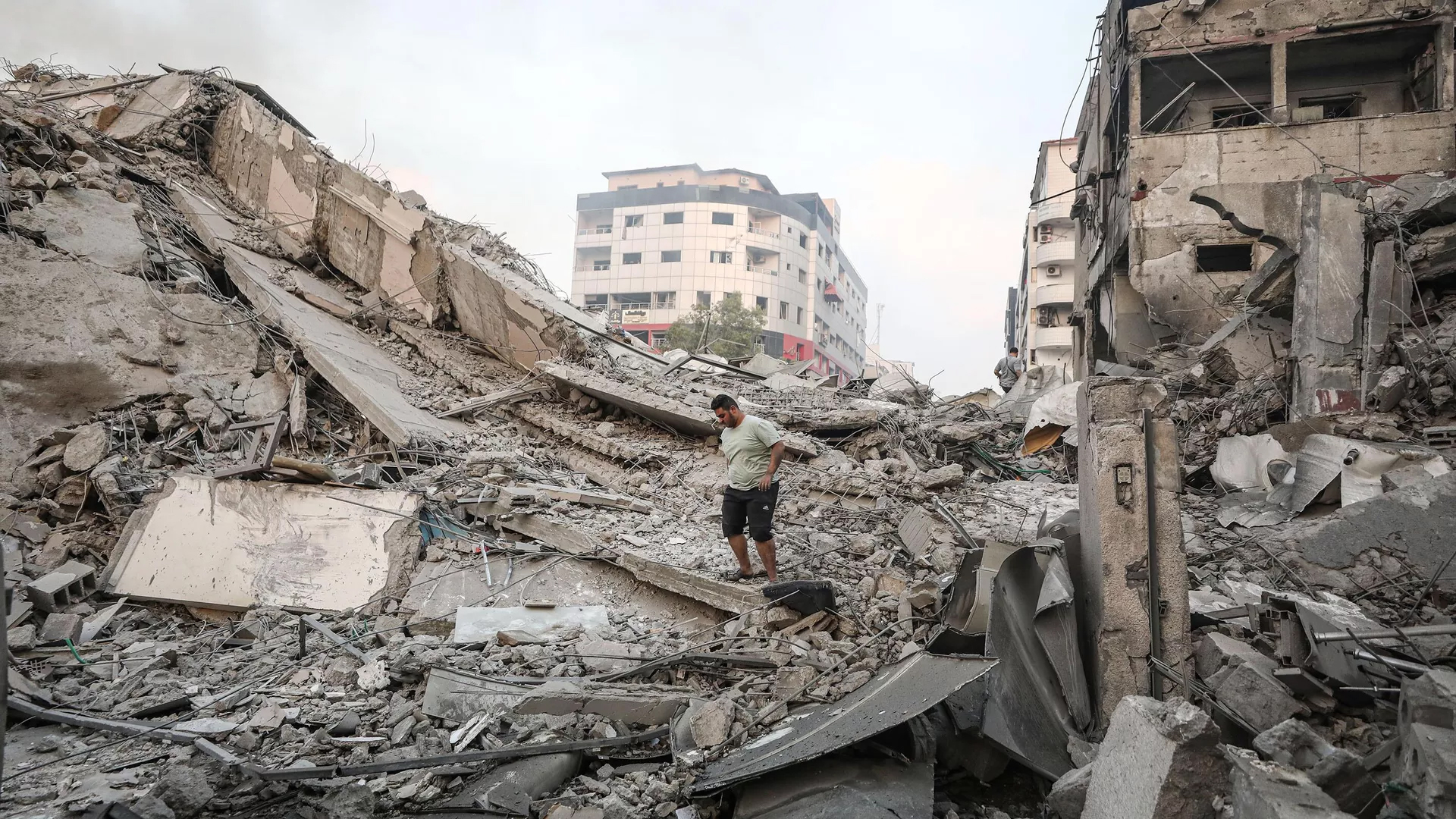
 |
|
Photo Credit: Fatima Shbair, Getty Images. |
Civilians are suffering in the ongoing war and more than 3 million people living in the Gaza Strip and the West Bank need urgent help.
As the situation deteriorates, the International Blue Crescent Relief and Development Foundation (IBC) is delivering life-saving aid to the many children, women, and men enduring unimaginable agony.
CRISIS OVERVIEW
Food
In Gaza, an estimated 2.2 million people are on the brink of starvation, states a recent UN report. Further, 90% of the population report regularly going a full day without food.
Prior to this escalation in conflict, many people were already living with food insecurity. The World Health Organization (WHO) notes that 63% of the population faced hunger before this period of war. Now, the entire region is categorized as a humanitarian catastrophe with many people living in famine conditions.
Electricity and Fuel
The destruction of basic infrastructure has halted critical services in Gaza where a full electricity blackout has been in effect since 07 October 2024. Gaza’s only power plant is now defunct, and generators have fallen silent as a widespread lack of fuel continues to complicate the delivery of healthcare services and humanitarian aid.
Further, the lack of electricity has caused manufacturing and agricultural activities to grind to a halt undermining Gaza’s already fragile economy. Trucks and convoys are unable to deliver aid and critical services due to insufficient fuel supplies.
 |
|
Photo Credit: AA / Mustafa Hassona. |
Healthcare
Hospitals all over Gaza have been shut down due to constant bombardments, lack of electricity and medical supplies. Only 9 of the 36 hospitals in Gaza are still operational as of 19 December according to the World Health Organization (WHO). Those health facilities still in operation are currently running on critically low levels of fuel and basic medical supplies. The Ministry of Health in Gaza reports that hospitals are operating at 206% in in-patient departments and 250% in intensive care units.
Reports of medical staff being arrested by Israeli forces have been submitted by the MoH in Gaza and reports of hospitals coming under fire have also been noted by the WHO.
In a troubling statement, UNICEF’s spokesperson James Elder describes the imminent danger of health conditions for children living in the Gaza Strip where there is on average one toilet for 700 children and families, “Without sufficient safe water, food and sanitation that only a humanitarian ceasefire can bring - child deaths due to disease could surpass those killed in bombardments.”
Displacement
Areas making up nearly 30% of the Gaza Strip have been marked for evacuation according to an Israeli Army online map. However, gaining access to information from this area is challenging due to the ongoing electricity blackout and interruptions in telecommunications services.
Estimating an accurate total number of IDPs is also difficult as nearly 1.9 million people, or 85% of the population, are thought to be internally displaced. Shelters are serving 4 times their capacity and struggling to provide accommodation for the sheer number of people in need. As such, those living in the overcrowded shelters are forced to endure extreme conditions, lack of heat, makeshift latrines, rain, and flooding.
HUMANITARIAN RESPONSE AND PROGRAMMING
The IBC Crisis Appeal calls for approximately US $ 3 million to address the most urgent needs of the people living in the occupied Palestinian territory, particularly in the Gaza Strip.
Our work is the culmination of decades of experience in crisis response and humanitarian relief across the region.
Food and Nutrition
Funding Required US $ 800,000
Target no. of Beneficiaries: 20,000
Distribution of food parcels, wheat flour, and ready to eat meals is at the core of our emergency food response. To address challenges of preparing meals without access to proper sanitation and sufficient cooking supplies, IBC will provide hot meals, bottled water, and community kitchen kits and the necessary fuel for cooking.
Shelter and Non-Food Items
Funding Required US $ 720,000
Target no. of Beneficiaries: 16,000
As large-scale displacement currently plagues the people of the Gaza Strip, and recognizing shelter as a basic need, IBC will provide essential non-food items (NFIs) and shelter materials to ensure the rapidly changing needs of IDPs are met with the appropriate goods. IBC will provide winterized tents, tarpaulins and plastic sheeting. To protect against the cold of winter, IBC will distribute thermal blankets and mattresses.
To address the challenges posed by living in temporary conditions, IBC will provide sets of cooking utensils, household essential items such as gas tanks, ovens, and cooking devices, as well as water storage tanks.
WASH
Funding Required US $ 425,000
Target no. of Beneficiaries: 8,500
IBC’s planned response in Water, Sanitation and Hygiene (WASH) prioritizes the provision of safe and reliable supply of water for drinking and domestic purposes in order to promote health, hygiene and safety. IBC will deliver emergency sanitation assistance through the provision of cleaning kits, water purification tablets, water storage tanks, jerry cans, and hygiene kits.
Healthcare and Mental Health and Psychosocial Support
Funding Required US $ 200,000
Target no. of Beneficiaries: 4,000
IBC’s response to health centers on the immediate delivery of direct healthcare assistance simultaneously addressing the urgent health needs of the affected population and strengthening existing health facilities. IBC will procure and distribute essential medical and sanitation supplies, fuel to run medical facilities and equipment, and medical consumables to existing health facilities to support them in managing large influxes of patients.
To support childhood nutrition and essential development, IBC will deliver high energy biscuits to children under the age of five, as well as iron-folate supplements to pregnant and breastfeeding women.
Moreover, IBC will deliver high-quality mental health and psychosocial support to beneficiaries in need.
Protection
Funding Required US $ 115,000
Target no. of Beneficiaries: 2,200
IBC places the principles of safeguarding and protection at the core of all our interventions, mainstreaming the values and practices into our work to avoid causing harm and to promote safe and meaningful access to aid for all people in need.
IBC will address gender-based violence by providing essential dignity kits to women and girls, menstruation supplies, counseling and support.
Child-friendly spaces are integral parts of our response and further promote safety and equal access to essential assistance for children, particularly during this time of heightened need.
Acknowledging the risks of human trafficking and sexual exploitation and abuse, IBC is committed to assisting victims in line with established referral pathways.
Education
Funding Required US $ 250,000
Target no. of Beneficiaries: 5,000
Children living in the Gaza Strip are without education or the opportunity to learn in a safe, nurturing environment. To address the education gap caused by the current conflict, IBC will provide emergency learning and recreational supplies, temporary learning spaces, child-friendly areas, and age-appropriate psychosocial support. When the situation allows, IBC is committed to rebuilding schools as a priority in reconstruction and recovery.
Multi-Purpose Cash Assistance
Funding Required US $ 280,000
Target no. of Beneficiaries: 5,600
IBC views multi-purpose cash assistance (MPCA) as a crucial intervention which enables people to meet their basic needs according to their preferences and cultural values. Cash transfers have been recognized as one of the most effective operational modalities in the region and allow for the rapid acquisition of goods. Families and individuals needing urgent cash assistance can benefit from our cash transfer program which allows beneficiaries to acquire food, water, medicines, hygiene products and non-food items that align with their individual needs and preferences.
Logistical Support
Funding Required US $ 280,000
Target no. of Beneficiaries: 100
Logistical support for IBC’s emergency response operations in the Gaza Strip will rely on inter-agency cooperation and the expertise of IBC staff and personnel. From our headquarters to ground operations, we are committed to delivering comprehensive, sensitive, and effective programming to those most in need, without discrimination or delay.
CROSS-CUTTING ISSUES
IBC centers its work on the principles and practices of safeguarding and protection, recognizing the heightened risk of violence, neglect, deliberate deprivation, discrimination, abuse and exploitation affecting populations living in conflict zones and among displaced peoples. Therefore, all IBC interventions are designed to protect the rights, safety and dignity of affected populations. Safeguarding, prevention of and response to sexual exploitation and abuse (PSEA) will continue to be mainstreamed throughout IBC’s interventions within the Gaza Strip and in every community in which we work.
IBC will integrate Accountability to Affected Populations approaches throughout its interventions. This means IBC will engage affected communities in the planning of interventions and responses in order to respect the autonomy of beneficiaries, understand clearly their different needs, and provide clear channels of information flows to enable effective empowered and informed decision making. IBC will also establish complaint and feedback mechanisms to maintain accountability for the quality and relevance of the assistance we provided.
COORDINATION
Interventions carried out through this Crisis Appeal are in line and complementary to country level response planning. IBC works closely with governments, humanitarian coordinators, the UN OCHA coordination mechanism, and partners to contribute to the necessary humanitarian response and contingency planning in the Occupied Palestinian Territories.
IBC CAPACITY
IBC has well established offices throughout the MENA region with ongoing humanitarian, disaster responses and development initiatives implemented in collaboration with humanitarian actors and government authorities. While IBC has no operational presence in the Occupied Palestinian Territories, West Bank nor Israel, the capacity and regional presence through our existing programming allows us to pivot ongoing work and respond to the crisis, in particular through its relationship with border authorities, Egyptian Local Partners, UNRWA and other UN entities and civil society partners inside Gaza
IBC’s regional presences and established partnerships, supported by multi-thematic expertise including at regional and headquarters levels, enables us to implement agile, responsive programming with flexibility in the face of an ever-changing, rapidly evolving context, supported by our continuous conflict and protection analyses.
IBC integrates human-rights based and gender-sensitive approaches in all of our interventions. Moreover, our dedication to the principles of Accountability to Affected Populations means that we will engage affected communities in planning interventions. IBC will also establish complaint and feedback mechanisms and use established referral mechanisms to maintain accountability for the quality of our work and the assistance we provide.
CONTACTS
Muzaffer Baca
Vice President
+90 532 234 42 29
[email protected]
Heather Sonya Üner
Programs/Partnerships Manager
+90 544 830 84 17
[email protected]
Mohamed Ouahi
MENA Programs Manager
+90 534 368 35 45
[email protected]
To follow our work, visit our website: www.ibc.org.tr or follow us on...
Twitter: @ibc_tr
YouTube: IBC Uluslararası Mavi Hilal
Instagram: @ibctr
Facebook: IBC Uluslararası Mavi Hilal Vakfı
LinkedIn: International Blue Crescent (IBC)